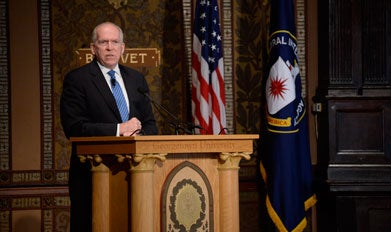Title: CIA Director Speaks at Agency’s First Public National Security Conference
Lorem ipsum dolor sit amet, consectetur adipiscing elit, sed do eiusmod tempor incididunt ut labore et dolore magna aliqua. Ut enim ad minim veniam, quis nostrud exercitation ullamco laboris nisi ut aliquip ex ea commodo consequat. Duis aute irure dolor in reprehenderit in voluptate velit esse cillum dolore eu fugiat nulla pariatur.
The 67-year-old Central Intelligence Agency (CIA) is facing historic challenges that affect national security and the transparency of intelligence collection, the agency’s director said at Georgetown yesterday.
“Today – and certainly not for the first time in our history – America’s intelligence community is at a crossroads,” said CIA director John O. Brennan at the agency’s first public national security conference. “The transformational impact of technology and enhanced scrutiny and skepticism of the value, legality and appropriateness of our mission have prompted a reexamination of the work of intelligence agencies, understandably and rightly so.”
The all-day conference in Georgetown’s historic Gaston Hall, “Ethos and Profession of Intelligence,” was co-sponsored by the university’s Security Studies Program.
No Crystal Ball

“While we do not have a crystal ball, we have an obligation as intelligence professionals to look beyond the next horizon to not only highlight key events around the globe, but to explain the forces that are likely to shape those developments in the weeks, months and years to come,” said CIA director John O. Brennan.
A host of panelists at the conference explored a number of topics, including the status of intelligence work in the 21st century, intelligence and the private sector, cybersecurity threats and the balance between secrecy and transparency.
Citing global issues such as the rise of extremism, territorial disputes and cyber attacks, Brennan said identifying and analyzing information before an event occurs is the CIA’s priority.
“While we do not have a crystal ball, we have an obligation as intelligence professionals to look beyond the next horizon to not only highlight key events around the globe, but to explain the forces that are likely to shape those developments in the weeks, months and years to come,” he said.
Preventing Attacks

Former FBI director Robert Mueller, who delivered the conference’s opening remarks, just completed a year as Georgetown’s first distinguished executive-in-residence.
Former FBI director Robert Mueller delivered the conference’s introductory remarks.
Mueller, who began his tenure as FBI director one week before the 9/11 terrorist attacks, detailed how the FBI transitioned its priorities to counterterrorism and counterintelligence during the start of his 12-year tenure.
“No longer could our metric [for success] be the number of arrests, the number of indictments, the number of convictions, but how well we were doing developing sources, putting up wires [and] answering that one question: what are you doing to prevent the next terrorist attack,” said Mueller, who just completed a year as Georgetown’s first distinguished executive-in-residence.
No Better Institution
Conference panelists and moderators included U.S. Rep. Mike Rogers (R-Michigan), chair of the House Permanent Select Committee on Intelligence; Bruce Hoffman, professor and director of the Center for Security Studies at Georgetown; Siobahn Gorman, reporter forThe Wall Street Journal; John Negroponte, former U.S. deputy Secretary of State and former ambassador to Iraq; and Paul Pillar, security studies faculty member and author of such books asIntelligence and U.S. Foreign Policy: Iraq, 9/11, and Misguided Reform(Columbia University Press, 2011).
Brennan thanked Georgetown for hosting the conference.
“There’s simply no institution better suited to host a discussion of the topics we are tackling today,” he said. “It is a privilege for me to be among the students and faculty of this great school.”
Related Information
Bruce Hoffman Profile
Security Studies Program
Center for Security Studies
School of Foreign Service